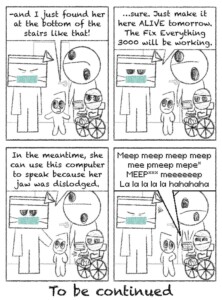“What can I help you with?”
These are the words that flash across the screen as Siri, Apple’s digital personal assistant is activated. Emerging technologies seem to be changing the way that this phrase is expressed; as these digital personal assistants become smarter and more capable, they increasingly will be asking us what we can do for them.
Earlier this month, Microsoft released both its Siri-equivalent personal assistant, “Cortana,” and its own online public opinion polling website, Microsoft Prediction Lab. The lab is a forum where users can submit their opinions on topics ranging from elections to foreign affairs to social issues, according to the Microsoft Prediction Lab itself.
But according to the New York Times, what makes this website so unique and revolutionary is that Microsoft hopes to have Cortana “start conducting interviews herself, imitating human pollsters.” Cortana is hoped to become, essentially, the new “human pollster” and to administer “her” own interviews
Response rates of home telephone polling have decreased from 36% in 1997 to 9% in 2012. “They’ve really been trying to adapt to the changing times,” senior Committee for Political Engagement member Jenny Hansler said of the new polling techniques. “It’s been geared a lot more towards ‘trendiness,’ as in they’re trying to get people in our generation to see [voting and expressing their opinion] as ‘trendy’ and ‘important,’ whereas in the past it was seen more as just ‘this is what you do.’”
Although phone polling is becoming increasingly less effective, the need and desire for massive amounts of data is only increasing.
“Big data,” large sets of information that are analyzed to uncover patterns and trends, “has only been in the public awareness for the past few years, but if you go back and look at what has been going on in university research, it’s really been a change over the last 25 years” director of the UR Institute of Data Science Henry Kautz said.
Its usefulness is not limited to one specific field. In medicine, “instead of running a big clinical trial, you can go back and look at existing large data sets and discover the information you need,” Kautz said. “Governments can make better decisions about everything from healthcare to cleaner energy production just based on data and statistical analysis.”
UR has been putting more and more focus on the growing importance of data science in both academics and research. The Institute for Data Science was initiated in October 2013. Programs for B.S., B.A., and Masters degrees in Data Science are currently under review
The UR Medical Center has created one of the largest datasets in the country on cardiac patients.
“It has really exploded,” Kautz said. “The number of degree programs in data science is up to around 40, and there could even be 80 by next year.”
Data collection involving students on a smaller scale has become more common as well, from Dining Services to SA elections to student organizations surveying their own members through services such as Doodle and Survey Monkey.
Providing incentives has been seen as one of the most important tactics for success.
“When you incentivize, when you have a topic [of interest], and when you reach out to get that feedback, that’s where we see the best results” Marketing Manager of Dining Services Kevin Aubrey said. In the past few years, Dining Services has attempted to collect feedback from students on “whatever platform they will integrate with us,” including snap polls in Dining emails, social media, monthly dining committee meetings, and national benchmarking surveys.
The Microsoft Prediction Lab has recognized the need to motivate participants as well, and has created an incentive program to initiate greater participation in which “points will be rewarded to the ‘best crystal ballers,’” according to NewsBeat Social. The more information that is available, the more valuable it becomes not only to Microsoft, but to the government and the public as a whole, as it also offers a feature that compares participant opinions with the majority.
Even in spite of the volatility of elections due to new influxes of students and representatives, the SA has tried to compare data on voter turnout from year to year, according to sophomore SA Deputy Elections Chair Paul Jaquish. There is not, however, any predictive outlook polling on elections. “It would be interesting, and I would love to see what kind of differences there would be, [but] there’s only so far in advance you can do these things because we don’t know until a week and a half [beforehand] who is running,” Jaquish said.
One problem with collecting data on student opinions, as well as public opinion in general, is that the voluntary sample of participation is often very biased. “When getting student opinion, I think you always have the flaw that people who give their opinions are always the same people,” Jaquish said. “It’s not your average student because your average student isn’t involved with SA government, and that will always be a problem.”
This is also an issue on the national level. “Even if Microsoft is effective in collecting these types of [public] opinions, I’m not sure if it will still be getting these voices that are marginalized from the polling conversations,” Hansler said. “I think that it would still be targeting a mainstream demographic whose opinions are already being addressed within a political sphere.”
Pollsters and data collectors have faced these issues for years,and there does not appear to be anything hindering attempts to collect further information. Even in spite of critiques that Microsoft phone users will not be representative of the population as a whole, it shows that outreach to individuals is becoming an even more normalized part of everyday life.
In the words of Kautz, “[Data science] is here for the long term.”
Douglas is a member of the class of 2017.
